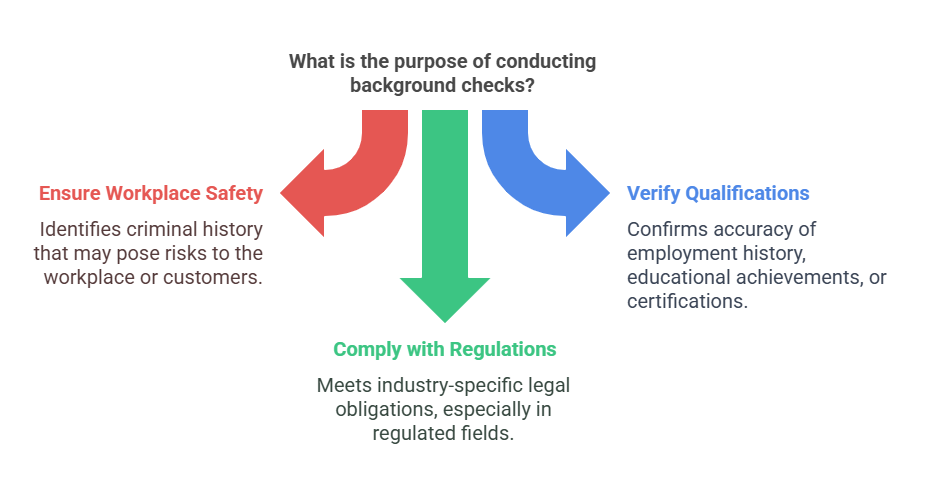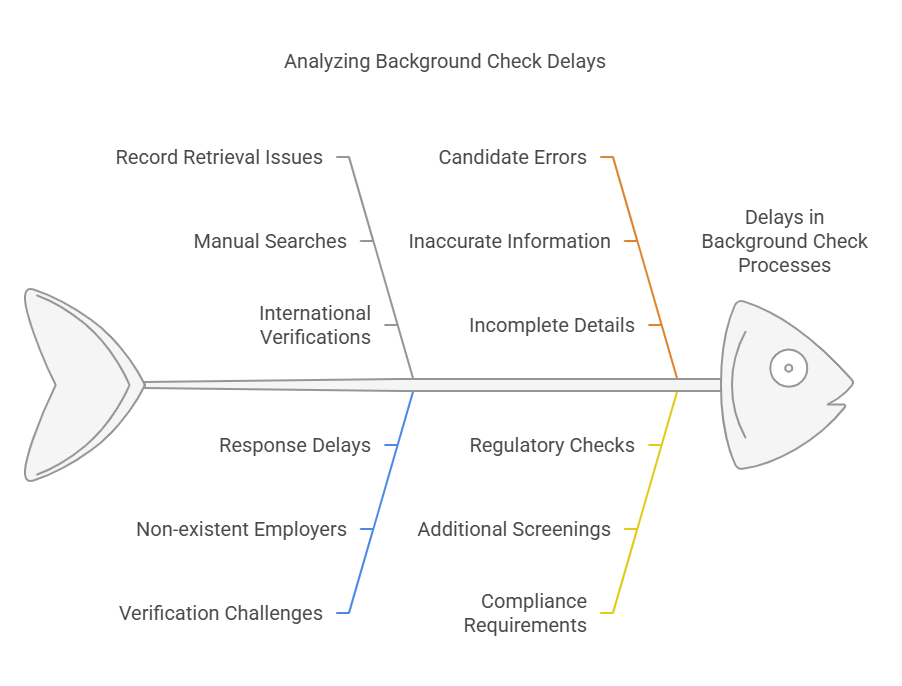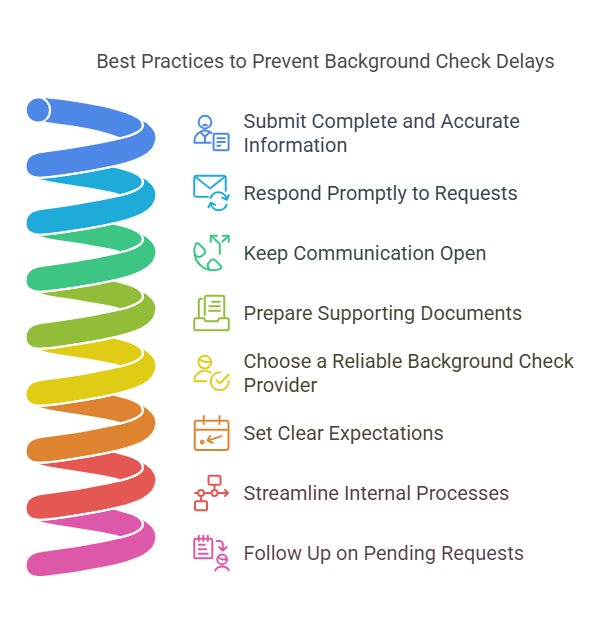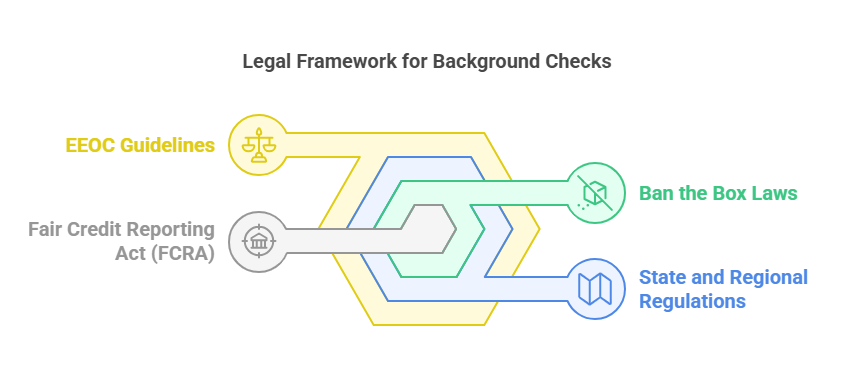Reasons Your Background Check Might Take Longer

What Is a Background Check?
A background check is a process used to verify an individual’s history, identity, and credentials. Employers, landlords, and organizations use these checks to ensure a candidate is trustworthy, qualified, and compliant with any legal or industry requirements.
Why Employers Conduct Background Checks:

- Ensure Workplace Safety: To identify any criminal history that may pose a risk to the workplace or customers.
- Verify Qualifications: To confirm the accuracy of employment history, educational achievements, or certifications.
- Comply with Regulations: To meet industry-specific legal obligations, especially in fields like healthcare, finance, and childcare.
Types of Background Checks:
- Criminal History: Reveals felonies, misdemeanors, or pending charges.
- Employment Verification: Validates past job roles, dates of employment, and responsibilities.
- Education Verification: Confirms degrees, certifications, and academic history.
- Credit Checks: Reviews financial responsibility for roles involving money management.
How Long Does a Background Check Take?
The time required to complete a background check depends on the type of check, the scope of verification, and external factors like location or holidays. On average, most checks are completed within 1–5 business days, though some may take longer.
Typical Timelines for Background Checks:
- Criminal Record Check: 1–3 business days.
- Employment Verification: 3–5 business days.
- Education Verification: 2–3 business days.
- Credit Check: 1–2 business days.
- Federal Records Check: 2–5 business days.
Common Reasons for Background Check Delays

While most background checks are straightforward, there are instances when the process takes longer than expected. These delays can arise from various factors, including:
1. Difficulty Retrieving Records
Some jurisdictions or institutions may not have digital record-keeping systems, requiring manual searches that extend timelines. For example:
- Court Records: Many local courts rely on paper-based systems, which require manual searches.
- International Records: Verifying records outside the U.S. can involve navigating different systems and languages.
2. Verification Challenges
Verifying details like employment history or education can take time, especially if:
- Past employers are no longer in business.
- Educational institutions take time to respond to inquiries.
- Discrepancies in submitted information require clarification.
3. Holidays or Peak Hiring Periods
During holidays or periods of high hiring demand, background check providers may face backlogs that slow down the process.
4. Candidate Errors
Inaccurate or incomplete information provided by the candidate can cause delays. Common errors include:
- Incorrect employment dates.
- Misspelled names or mismatched identification details.
5. Compliance or Additional Screening Requirements
For regulated industries, additional screenings (e.g., drug tests, federal background checks) may be mandatory, which adds time to the process.
Is It a Bad Sign If Your Background Check Takes a Long Time?
Not necessarily. While delays in background checks can cause anxiety, they are often due to logistical or administrative reasons rather than negative findings. Below are common reasons why a delay does not indicate a problem:
1. Administrative Backlogs
Background check providers may face delays during holidays or periods of high demand, slowing the processing time for all applicants.
2. Need for Additional Verification
Some roles, particularly in sensitive industries like healthcare, finance, or government, require thorough checks that involve multiple steps and agencies.
3. Jurisdictional Challenges
If a candidate has lived in multiple states or countries, retrieving records from multiple sources can extend timelines.
4. Positive Verification Delays
Even when the outcome is favorable, delays can occur if previous employers or institutions take time to respond.
When to Be Concerned:
While delays are often harmless, certain situations may require follow-up:
- No Communication: If neither the employer nor the background check provider provides updates.
- Extended Delays: If the process exceeds two weeks without explanation.
- Discrepancies: If you suspect inaccurate information may be causing the delay.
If you experience a prolonged delay, it’s best to contact the employer or the background check provider for clarification.
Factors Contributing to Background Check Delays
Even though most background checks are processed within a few business days, various factors can cause delays. Here’s a closer look at some common issues:
1. Incomplete or Incorrect Candidate Information
When candidates provide incomplete or inaccurate information, the verification process can take longer. Examples include:
- Misspelled Names: A mismatch between your legal name and the one provided may cause issues.
- Incorrect Employment Dates: Employers may flag inconsistencies when verifying work history.
- Omitted Addresses: Missing residential history can lead to delays in criminal record searches across jurisdictions.
How to Avoid It:
Double-check all information on your application and ensure it matches official documents.
2. Outdated or Manual Databases
Some institutions, such as local courts or smaller companies, rely on paper records or manual searches, which can significantly slow the process.
Examples:
- Court Records: Many smaller courts still require in-person searches.
- International Records: Records from other countries may involve navigating varying legal systems, languages, and databases.
How to Address It:
If you’ve lived in jurisdictions known for manual records, inform the employer or background check provider in advance to help manage expectations.
3. Delayed Responses from Third Parties
Background checks often rely on responses from third parties, such as past employers, academic institutions, or government agencies. Delays can occur if:
- A former employer is no longer operational or unresponsive.
- An educational institution has limited staff availability.
- Government agencies are dealing with backlogs.
How to Mitigate:
- Notify former employers or schools that they may receive a verification request.
- Provide alternate contact details (e.g., an HR email) if available.
4. Employer-Specific Screening Requirements
Employers in highly regulated industries like healthcare, finance, or government may require additional screenings, such as:
- Drug Tests: These must be scheduled and processed through authorized labs.
- Federal Background Checks: For roles involving national security or government work, checks may involve federal databases, which take longer.
Best Practice:
Understand the specific background check requirements for your industry and prepare accordingly.
5. Seasonal or Peak Demand Periods
Background check providers often experience higher demand during peak hiring periods, such as:
- Holidays: Reduced staffing levels during holiday seasons can create delays.
- Graduation Seasons: Large volumes of checks are requested as new graduates enter the workforce.
What to Do:
- Apply for jobs early during peak seasons to avoid extended wait times.
- Be patient and communicate with the employer for updates.
Implications of Delays for Job Seekers and Employers
For Job Seekers
- Stress and Uncertainty: Delays can cause candidates to worry about their job prospects.
- Missed Opportunities: A prolonged background check may lead to losing out on other job offers.
- Potential Errors: Delays could indicate a mismatch or error in your records, requiring follow-up.
For Employers
- Impact on Operations: Hiring delays can slow down project timelines or onboarding schedules.
- Risk of Losing Candidates: Top talent may accept other offers during the waiting period.
- Reputation Issues: A slow hiring process can affect how candidates perceive the company.
Best Practices to Prevent Background Check Delays

For Job Seekers
- Submit Complete and Accurate Information:
- Verify personal details, employment dates, and academic history before submitting your application.
- Respond Promptly to Requests:
- If the employer or background check provider requests additional information, respond as quickly as possible.
- Keep Communication Open:
- Proactively follow up with the employer or provider if you suspect delays.
- Prepare Supporting Documents:
- Have copies of your degree certificates, past pay stubs, or other documents ready to provide if needed.
For Employers
- Choose a Reliable Background Check Provider:
- Partner with a trusted service like Exact Background Checks to ensure efficient, accurate, and compliant results.
- Set Clear Expectations:
- Communicate the expected timeline to candidates during the hiring process.
- Streamline Internal Processes:
- Reduce unnecessary steps in the background check process to prevent delays.
- Follow Up on Pending Requests:
- Actively track the status of checks and reach out to third parties when necessary.
Exact Background Checks: Streamlining the Process
Exact Background Checks is a trusted provider that specializes in fast, accurate, and reliable background checks. By using advanced technology and streamlined processes, they minimize delays while ensuring compliance with industry standards.
Services Offered by Exact Background Checks:
- Criminal Record Checks: Nationwide searches for felonies, misdemeanors, and pending charges.
- Employment History Verification: Detailed validation of previous job roles and dates.
- Education Verification: Quick confirmation of degrees, certifications, and academic history.
- Compliance Support: Ensures adherence to FCRA, EEOC, and other regulations.
Common Background Check Types and Timelines
| Type of Background Check | What It Covers | Typical Timeline |
|---|---|---|
| Criminal Records | Felonies, misdemeanors, pending charges | 1–3 business days |
| Employment Verification | Past employers, job roles, dates | 3–5 business days |
| Education Verification | Degrees, certifications, institutions | 2–3 business days |
| Credit History | Financial reliability | 1–2 business days |
| Federal Records Check | Federal crimes, lawsuits | 2–5 business days |




